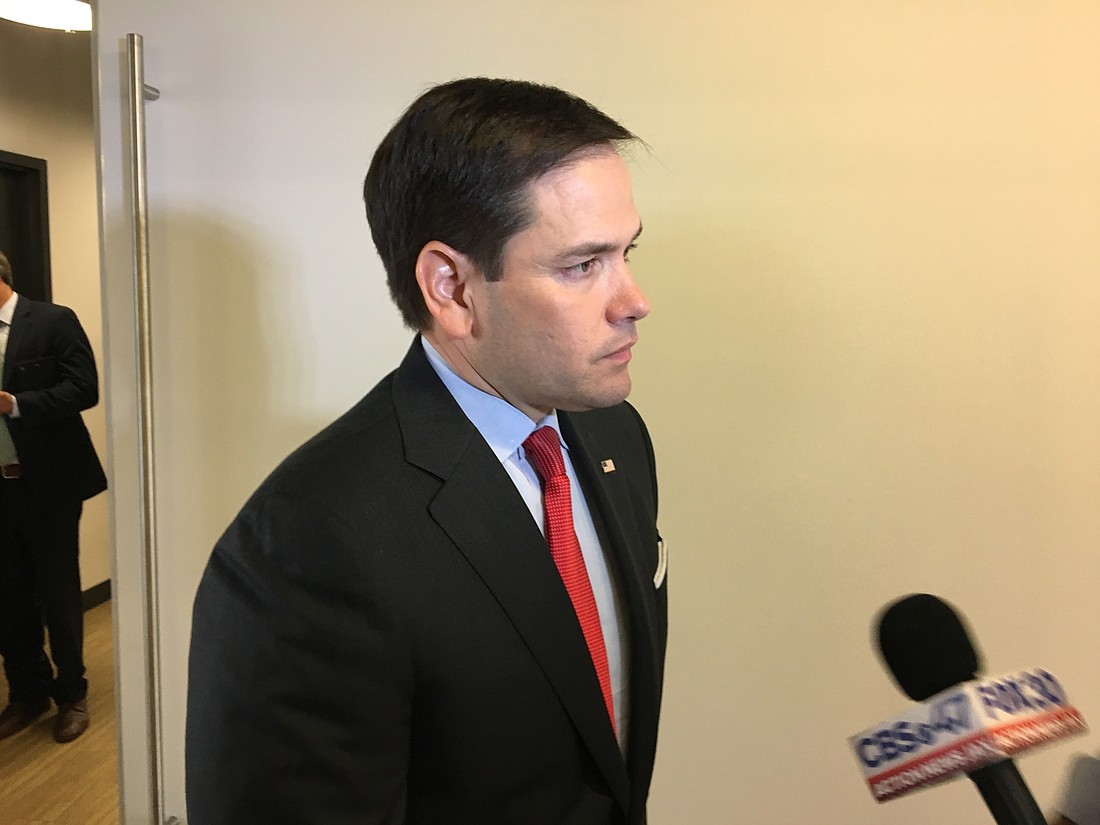
U.S. Sen. Marco Rubio brought his push for Republican-based tax reform to Jacksonville on Wednesday, with a roundtable discussion at JAX Chamber.
About 15 business leaders and residents were invited to the closed-door meeting as the senator spoke about his ideas for reforming the federal tax code, specifically the expansion of the federal child tax credit.
“We’re trying to get as many real stories from real people as possible so we can justify the need for that credit,” Rubio said after the meeting.
Depending on income and other factors, parents with children under the age of 17 can qualify for up to a $1,000 fedral tax credit per child.
Rubio said he would like to increase that to $2,500 per qualifying child, applied to both income and payroll taxes.
The senator is working with the White House and Ivanka Trump, daughter and advisor to the president. Rubio said he’s “hopeful” that meaningful tax reform can be accomplished under President Trump.
“I expect it would,” he said, “because a lot of the good economic news we’re getting on unemployment, and so forth, is happening because some of it is built on the assumption that tax reform is going to happen.”
Rubio touched on another Republican reform effort the Senate didn’t accomplish last month.
On July 28, the Senate failed to pass a bill to repeal parts of President Obama’s Affordable Care Act.
The Health Care Freedom Act would have done away with several provisions of what is commonly called “Obamacare,” including the individual mandate, which requires Americans to have health insurance.
Rubio supported the repeal attempt which ultimately was undone by members of his own party, including Arizona Sen. John McCain.
“I hope we revisit it again,” he said, “because many people like myself ran on the promise on repealing and replacing Obamacare.”
He said it was a promise the Senate didn’t keep.
Floridians, he said, continue to be “punished” by the 2010 law.
“Rate premiums are going up, meaning insurance companies are losing younger, healthier people,” he said. “As they leave, the rates will continue to rise.”
The Miami Republican also had strong words for North Korea and its leader, Kim Jong Un.
He said while he was hopeful a peaceful and diplomatic resolution to tension between the country and the U.S. was possible, “it runs contradictory to everything we’ve seen from this regime over the last 20 years.”
“I will tell you this, the day North Korea decides to attack the United States, or anyone of its neighbors, it will be the last day of the North Korea regime and the last day of Kim Jong Un’s life and I think he knows that,” Rubio said.
City Council unanimously approved fast-track legislation providing a $700,000 incentives package for a company being referred to as “Project Milan.”
Before the Tuesday vote, none of the 19 council members commented.
Milan is seeking a $700,000 Recapture Enhanced Value grant over the next 10 years ahead of a planned expansion in Jacksonville.
According to the legislation, Milan is agreeing to invest $28.5 million for a new Class A office building in South Jacksonville and add 10 employees to its existing workforce.
San Francisco-based McKesson Corp. seems to fit the profile of Project Milan. The company said previously it couldn’t comment.
It is the first fast-tracked bill, one that requires only two public hearings for passage, to be voted on during the new council year.
A new master plan for the Cathedral District was introduced during meetings Monday and Wednesday at the Jessie Ball DuPont Center.
The plan is being drafted by the nonprofit Cathedral District Jax Inc., which was formed earlier this year.
According to Ginny Myrick with Cathedral District Jax, the focus of the plan is to make the area a “legitimate neighborhood.”
“We’re about branding the neighborhood to bring developers in to make it residential,” Myrick said. “The rule of thumb with development is retail follows roofs.”
She said the meetings allowed interested stakeholders a chance to weigh in before they come back with a final version of the plan.
Myrick didn’t have an estimated financial cost associated with the project, other than to say it would require some city money and private capital investment.
“It’s very possible that the private sector will be interested enough to come in on the ground floor when there are very low price points,” she said.
One of the biggest challenges, according to Myrick, is the need for two-way and pedestrian-friendly streets in the area, “something that can be easily fixed,” she said.
Cathedral District Jax hired Washington, D.C., architects Torti Gallas and Partners to develop the plan after issuing a request for proposals earlier this year.
Erik Aulestia of Torti Gallas presented three scenarios, all with variations on how to approach parking in the area.
Each scenario features public art, bike and pedestrian-friendly two-way streets, residential, retail and green space.
Aulestia said conditions in struggling neighborhoods like the Cathedral District tend to improve when there are fewer regulations and parking requirements in place, “because it reduces the burden for developers looking to come in.”
Aulestia said the next step will be to determine three “catalytic projects” to start the neighborhood enhancements.
“I think this has great leadership in place,” Aulestia said. “It’s more than just a pretty picture.”
@DavidCawton
(904) 356-2466